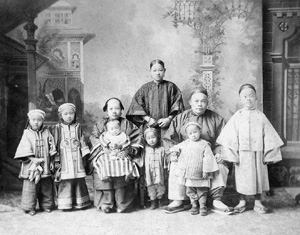WONG, FEE LEE (WING TSUE) (ca. 1846-1921)

Wong Family
View largerBetween 1848 and 1900 some 200,000 Cantonese were brought to the United States by labor contractors. Put to work at menial jobs in mining camps and on railroad construction crews, they moved eastward from California in the wake of new gold strikes. Some of them, including Fee Lee Wong, found their way to the Black Hills of Dakota Territory during the 1875–76 gold rush.
Hundreds of gold-hungry prospectors hastily erected rough cabins and tents along Whitewood and Deadwood Creeks in narrow Deadwood Gulch. By the late 1800s the north end of the mining camp's main street was a noisy, bustling Chinese village where Fee Lee Wong, better known as Wing Tsue, established his thriving business. His shop at 566 Main Street stocked a wide selection of Chinese foods and herbs, novelties, silk, tea, porcelain, and other luxury import gifts. Wing Tsue's name was listed in the 1880 census along with 212 other Chinese, most of them young men in their twenties and thirties. Actual numbers were probably much higher.
Although most of Deadwood's Chinese returned home or moved on to larger cities as the gold rush waned, Wing Tsue remained for forty years, becoming a prominent and respected businessman. When he brought his wife, Hal Shek Wong, from China, he announced she would be pleased to receive wives of his white business friends in their home on New Year's Day. In her book Old Deadwood Days, Estelline Bennett described the luxuriously appointed Wong home and said Mrs. Wing Tsue herself was "the loveliest bit of exquisite china I ever saw."
The Wong children, two sons and four daughters, attended Deadwood's public schools and Sunday schools. Records of Mount Moriah Cemetery show the burial of an eleven-month-old child of Wing Tsue on January 30, 1895, and the removal of the body in 1904. Another daughter, born in 1900, died in 1902.
According to a family biography compiled by his grandson, Wing Tsue took his family back to China in 1902, then had difficulty reentering the United States two years later. Intervention by a U.S. congressman allowed him to return to Deadwood. The First National Bank of Deadwood bought the Wing Tsue building for $1,055 in 1915 when the Chinese merchant defaulted on the loan. The family left Deadwood for the final time in 1919, after Wing Tsue suffered a stroke at a meeting of the Society of Black Hills Pioneers. He died in Canton, China, in 1921 at the age of seventy-five.
See also IMAGES AND ICONS: Deadwood, South Dakota.
Rena Webb Rapid City, South Dakota
Bennett, Estelline. Old Deadwood Days. New York: J. H. Sears, 1928.
Fielder, Mildred. The Chinese in the Black Hills. Deadwood SD: Centennial Distributors, 1982.
Previous: Vietnamese | Contents | Next:
XML: egp.asam.023.xml
